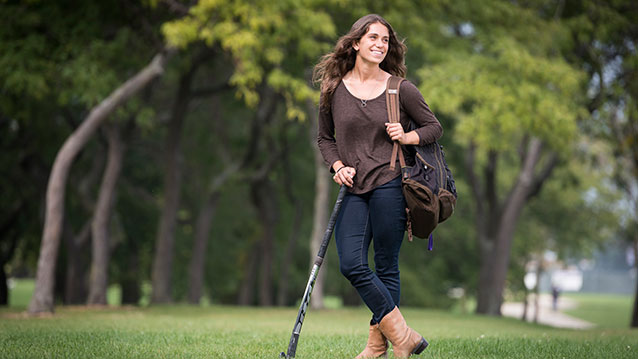EVANSTON, Ill. --- As an avid high school field hockey player, Kelsey Gradwohl thought Northwestern University would be a perfect fit -- in the classroom and on the turf.
“When I came here, something clicked,” said Gradwohl, now beginning her senior year as a psychology major in the Weinberg College of Arts and Sciences.
She is a key defensive player who helped bring the Northwestern field hockey team its first Big Ten Tournament title last year. Her time as a Wildcat off the field has also been all that she expected -- and more.
Taking advantage of a research opportunity during her junior year, Gradwohl began working in the cognitive neuroscience lab run by Ken Paller, a professor of psychology in Weinberg and director of the Cognitive Neuroscience Program at Northwestern.
Paller’s research touches on consciousness, and more specifically, memory, and has been prominently featured in The New York Times. A recent study by the neuroscientist showing that sleep-based intervention can at least temporarily reduce implicit social biases appeared in pieces by the Times and National Public Radio.
Now one of a growing number of undergrads to receive funding for their own research projects, Gradwohl is thrilled that she got the opportunity to collaborate with Paller in his lab on a project of her own design. Her work this summer on two techniques that could improve memory retention during sleep will become part of her senior thesis and help prepare her for medical school.
Named one of Northwestern’s 46 prestigious Big Ten Distinguished Scholars and a two-time Academic All-Big Ten Athlete, Gradwohl said Northwestern has given her the “perfect combination of what I wanted -- a good field hockey program and an incredible education.”
Read more in a Q&A with Gradwohl, who recently spoke to Northwestern News about her research and reflected on her time at Northwestern.
As a student-athlete who does undergraduate research, you must be crunched for time. How do you juggle class, practices and working in the lab during the school year?
If there’s anything I’ve learned from working in the sleep lab, it’s do not sacrifice your sleep. Sure, sometimes you have to, but all-nighters aren’t that beneficial. Even if you don’t nap or sleep with target memory reactivation or any other enhancement methods, people have better memories of what they learn when they sleep.
Did you see yourself doing research before coming to Northwestern?
Ask me four years ago and I would’ve said, “Oh, I don’t want to go into research.” But what I’ve found is the more I get into it, the more interesting the research becomes. My research this summer is focused on memory enhancement. In combining two techniques during sleep, I am trying to determine if they could be more effective in tandem.
Walk me through your study. How are you testing these two techniques?
Participants come into the lab for sessions that take several hours. They learn the location of 54 images on a screen and a sound associated with each image. After a test to determine how much they remember, the participants take a 90-minute nap while wearing an electroencephalogram (EEG) cap, and we administer the two techniques, called Targeted Memory Reactivation and spindle induction. After the nap, the participants are given the same test again to look for improved memory retention.
In what way might your research impact the world or people’s everyday lives?
There will have to be lots of follow-up studies before we could say anything definitively, but let’s say someone who suffers from Alzheimer’s is having trouble remembering their grandchildren’s names. Maybe playing them during sleep could help them remember.
What has it been like working with Ken Paller?
It’s been really great. I talked to him a lot about sleep in general and what others are doing, and we have lab meetings every week. He’s very involved with this project and has been extremely helpful.
How has undergraduate research changed you and the way you think about your studies?
I’ve really come to love research. I plan to write my senior thesis on this work, so being able to get through that this year will be great. I recently decided I would like to go to med school and am still looking into which areas of medicine would combine the things I’m really interested in.


